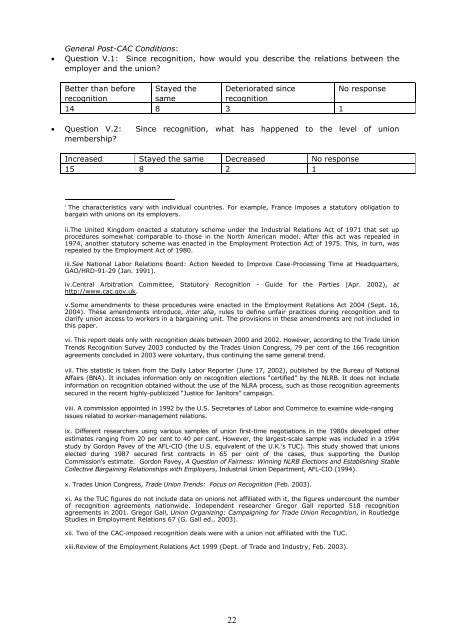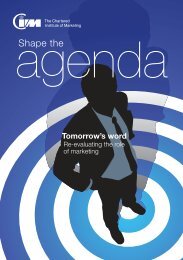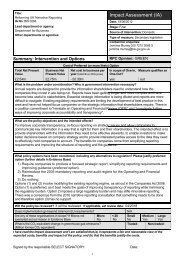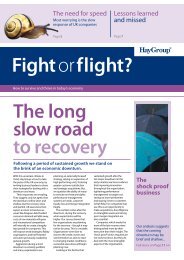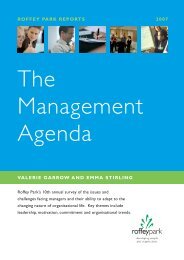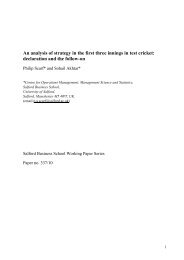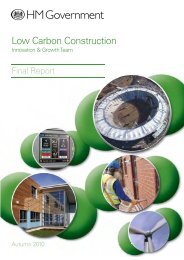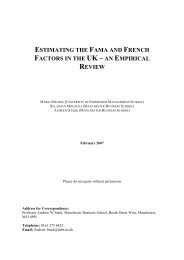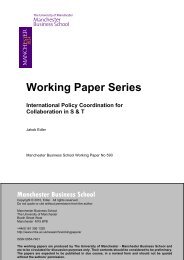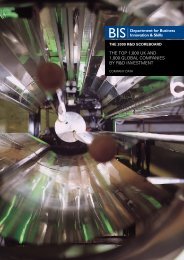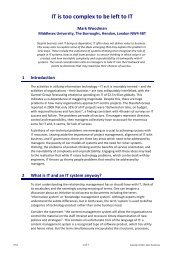Research Paper - Management and Business Studies Portal
Research Paper - Management and Business Studies Portal
Research Paper - Management and Business Studies Portal
You also want an ePaper? Increase the reach of your titles
YUMPU automatically turns print PDFs into web optimized ePapers that Google loves.
General Post-CAC Conditions:• Question V.1: Since recognition, how would you describe the relations between theemployer <strong>and</strong> the union?Better than before Stayed the Deteriorated sinceNo responserecognitionsamerecognition14 8 3 1• Question V.2: Since recognition, what has happened to the level of unionmembership?Increased Stayed the same Decreased No response15 8 2 1iThe characteristics vary with individual countries. For example, France imposes a statutory obligation tobargain with unions on its employers.ii.The United Kingdom enacted a statutory scheme under the Industrial Relations Act of 1971 that set upprocedures somewhat comparable to those in the North American model. After this act was repealed in1974, another statutory scheme was enacted in the Employment Protection Act of 1975. This, in turn, wasrepealed by the Employment Act of 1980.iii.See National Labor Relations Board: Action Needed to Improve Case-Processing Time at Headquarters,GAO/HRD-91-29 (Jan. 1991).iv.Central Arbitration Committee, Statutory Recognition - Guide for the Parties (Apr. 2002), athttp://www.cac.gov.uk.v.Some amendments to these procedures were enacted in the Employment Relations Act 2004 (Sept. 16,2004). These amendments introduce, inter alia, rules to define unfair practices during recognition <strong>and</strong> toclarify union access to workers in a bargaining unit. The provisions in these amendments are not included inthis paper.vi. This report deals only with recognition deals between 2000 <strong>and</strong> 2002. However, according to the Trade UnionTrends Recognition Survey 2003 conducted by the Trades Union Congress, 79 per cent of the 166 recognitionagreements concluded in 2003 were voluntary, thus continuing the same general trend.vii. This statistic is taken from the Daily Labor Reporter (June 17, 2002), published by the Bureau of NationalAffairs (BNA). It includes information only on recognition elections “certified” by the NLRB. It does not includeinformation on recognition obtained without the use of the NLRA process, such as those recognition agreementssecured in the recent highly-publicized “Justice for Janitors” campaign.viii. A commission appointed in 1992 by the U.S. Secretaries of Labor <strong>and</strong> Commerce to examine wide-rangingissues related to worker-management relations.ix. Different researchers using various samples of union first-time negotiations in the 1980s developed otherestimates ranging from 20 per cent to 40 per cent. However, the largest-scale sample was included in a 1994study by Gordon Pavey of the AFL-CIO (the U.S. equivalent of the U.K.’s TUC). This study showed that unionselected during 1987 secured first contracts in 65 per cent of the cases, thus supporting the DunlopCommission’s estimate. Gordon Pavey, A Question of Fairness: Winning NLRB Elections <strong>and</strong> Establishing StableCollective Bargaining Relationships with Employers, Industrial Union Department, AFL-CIO (1994).x. Trades Union Congress, Trade Union Trends: Focus on Recognition (Feb. 2003).xi. As the TUC figures do not include data on unions not affiliated with it, the figures undercount the numberof recognition agreements nationwide. Independent researcher Gregor Gall reported 518 recognitionagreements in 2001. Gregor Gall, Union Organizing: Campaigning for Trade Union Recognition, in Routledge<strong>Studies</strong> in Employment Relations 67 (G. Gall ed., 2003).xii. Two of the CAC-imposed recognition deals were with a union not affiliated with the TUC.xiii.Review of the Employment Relations Act 1999 (Dept. of Trade <strong>and</strong> Industry, Feb. 2003).22


